|
|
|
Sort Order |
|
|
|
Items / Page
|
|
|
|
|
|
|
| Srl | Item |
| 1 |
ID:
131095
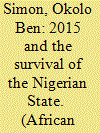

|
|
|
|
|
| Publication |
2014.
|
| Summary/Abstract |
Nigeria is currently faced with serious domestic challenges. While the state is not officially at war, it is standing on the precipice, especially with the eruption of violence occasioned by the emergence of the Boko Haram sect and the tenuous peace in the Niger Delta. With the 2015 general elections on the horizon, fears of further violence and disintegration are rife, more so because of the debate over who occupies the Presidential Villa at Abuja. President Goodluck Jonathan, a southerner, seems poised for a comeback even amidst the vociferous challenge posed by the political elites of northern Nigeria. This article looks at the different scenarios that might play out in 2015. It analyses the challenges of the survival of the Nigerian state, and makes some policy recommendations that Nigeria and its people need to put into place in order to ensure its survival beyond 2015.
|
|
|
|
|
|
|
|
|
|
|
|
|
|
|
|
| 2 |
ID:
144703
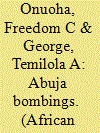

|
|
|
|
|
| Summary/Abstract |
Since his inauguration on 29 May 2015, President Muhammadu Buhari has taken several practical, policy and diplomatic actions aimed at defeating the six-year long insurgency by Boko Haram terrorists in Nigeria. These actions have started to have a modest positive impact on reclaiming the territories previously held by the terrorists. Boko Haram has reacted by ramping up its attacks on soft targets and communities in the north-east. This article focuses on Boko Haram's bombing activities in Nigeria's capital city, Abuja. It shows that between 2011 and 2015, Boko Haram has staged nine bombings in Abuja, resulting in the deaths of at least 191 people, including suicide bombers. It argues that the October 2015 suicide bombings in Kuje and Nyanya, Abuja, represent Boko Haram's bold attempt to respond to President Buhari's counter-insurgency efforts. The article proposes the ‘five Ds’ approach as part of robust measures for combating the insurgency.
|
|
|
|
|
|
|
|
|
|
|
|
|
|
|
|
| 3 |
ID:
180657
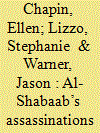

|
|
|
|
|
| Summary/Abstract |
In the study of terrorism, assassinations and suicide bombings have most commonly been considered as distinct phenomena. In practice, however, Al-Shabaab has shown a proclivity to use suicide bombings precisely as a means of assassination. But just how unique – if at all – is its use of suicide bombing assassinations (SBAs)? Using three unique databases on African suicide bombing combined with data from the Global Terrorism Database, this article seeks to understand the degree of uniqueness of Al-Shabaab’s SBA efforts from 2006 to 2020. In comparing Al-Shabaab to its nearest analogues – Boko Haram and Al-Qaeda in the Islamic Maghreb (AQIM) – across five different SBA metrics, this article demonstrates how Al-Shabaab is indeed rightly considered to be unique in its tendency to use suicide bombings as a tool for assassinations, at least on the African continent. It concludes by considering just what rationales underlie this proclivity, focusing on group-specific and environmental factors.
|
|
|
|
|
|
|
|
|
|
|
|
|
|
|
|
| 4 |
ID:
118805
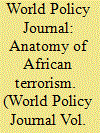

|
|
|
| 5 |
ID:
178661
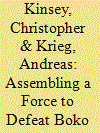

|
|
|
|
|
| Summary/Abstract |
In the context of an increased use of commercial soldiers in high-end conflict, this article investigates how the Nigerian government's reliance on the global market for force has helped its efforts to counter Boko Haram. The article shows, through a case study of Nigeria's counterinsurgency campaign against jihadist insurgents, that states in the developing world can augment their ability to provide effective public security by creating security assemblages. Moving beyond the normative debate about Private Military Companies (PMCs), this article highlights that public-private security arrangements can support the state in the developing world to live up to its role as a communal security provider. Nigeria's employment of the South African PMC Special Tasks, Training, Equipment and Protection Ltd. (STTEP), helped it build an effective public-commercial partnership, thus providing the Nigerian Armed Forces (NAF) with capacity, capability and norms that were essential in their counterinsurgency struggle.
|
|
|
|
|
|
|
|
|
|
|
|
|
|
|
|
| 6 |
ID:
131742
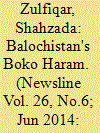

|
|
|
|
|
| Publication |
2014.
|
| Summary/Abstract |
The rise of a new extremist outfit in Balochistan has forced the closure of private school's in the district of Panjgur. Teachers, parents and students are calling out the local administration for capitulating to extremists in a region which already lags behind in education compared to other provinces.
|
|
|
|
|
|
|
|
|
|
|
|
|
|
|
|
| 7 |
ID:
174549
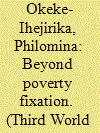

|
|
|
|
|
| Summary/Abstract |
This paper draws on fieldwork at three camps for internally displaced persons (IDPs) in Northeast Nigeria. It interrogates the pre-displacement experiences of participants, their transition to and experiences of internal displacement, vignettes of life at IDP camps, their relationship with host communities, the non-universality of experiences of sexual and gender-based violence among female IDPs (despite the particularities of experiences of women and young girls) and the resilience and agency of IDPs. The paper argues that scholarly engagement with IDPs and their social conditions should go beyond fixation on or fetishisation of poverty. Overall, the paper contributes to the empirical literature on conditions of internal displacement in sub-Saharan Africa.
|
|
|
|
|
|
|
|
|
|
|
|
|
|
|
|
| 8 |
ID:
149440
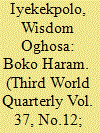

|
|
|
|
|
| Summary/Abstract |
Boko Haram insurgency has caused the death and displacement of thousands of Nigerians. Its means of terror has evolved from the use of crude weapons to bombs, kidnappings and the use of children as suicide bombers. Its reach has expanded beyond Nigeria into neighbouring West African countries and it has pledged allegiance to Al-Qaida and Islamic State. To address this security concern, its cause should first be ascertained. This paper argues that to do this, Boko Haram should be located in northern Nigerian historical context/environment. This paper reviews economic greed and grievance, extreme religious ideology and political opportunity in historic insurgencies in northern Nigeria. It finds that while the interplay of different factors shaped these insurgencies; it was political opportunity that ignited their onsets. Finally, the article submits that as long as these factors remain the same, military quelling of Boko Haram will not prevent a re-emergence of its likes.
|
|
|
|
|
|
|
|
|
|
|
|
|
|
|
|
| 9 |
ID:
153107
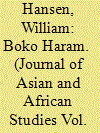

|
|
|
|
|
| Summary/Abstract |
This article is interested in shedding light on why a phenomenon such as Boko Haram came into existence and why it poses a threat to the very existence of the Nigerian state. The Boko Haram phenomenon, I argue, can only be understood as a reaction to more than a half century of corruption, venality, poverty, and abuse by the state predator class. My argument is that Boko Haram is the entirely logical consequence of more than five decades of the post-colonial Nigerian state ruled by a parasitic predator class that is itself a by-product of the colonial state.
|
|
|
|
|
|
|
|
|
|
|
|
|
|
|
|
| 10 |
ID:
139297
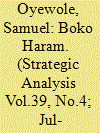

|
|
|
|
|
| Summary/Abstract |
The Boko Haram insurgency has emerged as one of the greatest threats to human security in Africa, and the Lake Chad region in particular. This is a region with a total area of 427,500 km2, which covers/ Cameroon, Chad, Niger and Nigeria. The movement known as Boko Haram (Western education is forbidden) originated in Nigeria in 2002. The official name of the movement is Jama’atu Ahlis Suna Lidda’awati Wal Jihad (People Committed to the Propagation of the Prophet’s Teachings and Jihad). The group was formed on the charismatic preaching of Yusuf Muhammad, which attracted hundreds of thousands of followers across northern Nigeria, Cameroon, Niger and Chad. The group’s campaign is informed by Islamic revivalism, widespread poverty, political corruption, repression and a weak justice system in the region.
|
|
|
|
|
|
|
|
|
|
|
|
|
|
|
|
| 11 |
ID:
139298
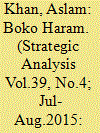

|
|
|
|
|
| Summary/Abstract |
Nigeria is currently going through a very delicate phase. The kidnapping of more than 275 Chibok schoolgirls by the terrorist organisation Boko Haram shocked not only Nigeria but the international community at large. This act by Boko Haram was widely criticised and led to worldwide condemnation and an international rescue effort. More seriously, the group leader Shekhau threatened to sell the girls into slavery and used Islamic teachings as justification.
|
|
|
|
|
|
|
|
|
|
|
|
|
|
|
|
| 12 |
ID:
122773
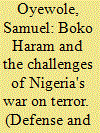

|
|
|
|
|
| Publication |
2013.
|
| Summary/Abstract |
Boko Haram terrorism has been recognized by Nigerian President Jonathan as the most threatening and complex security issue in Nigeria since independence. In response, the Federal Government of Nigeria has committed itself to different counterterrorism measures, which are largely dominated by "hard politics" and military mobilization. Spending heavily on defense to upgrade military hardware and train personnel in a counterterrorism role, Nigeria has also boosted its strategic importance in the "Global War on Terror". However, this attempt has become unpopular as it has failed to contain Boko Haram within a short time frame and has made insufficient headway against unabated terror, with human rights costs among the host communities and amidst a surge of stakeholders' discordance. As a matter of concern, this article seeks to assess Boko Haram as an opponent in Nigeria's war on terror (WOT) and to ascertain the challenges the country faces, the alternative measures open to it, and possible ways forward.
|
|
|
|
|
|
|
|
|
|
|
|
|
|
|
|
| 13 |
ID:
190863
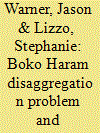

|
|
|
|
|
| Summary/Abstract |
This article introduces the “Boko Haram disaggregation problem,” or the often frequent failure by observers to disaggregate the group following its August 2016 split into two distinct factions, instead, labeling and studying all factions as “Boko Haram.” It asks: What are the origins of the “Boko Haram disaggregation problem,” and, given this phenomenon, what are the possibilities and constraints in understanding profiles of violence between the pre-2016 and post-2016 iterations of the group(s)? It argues that the “Boko Haram disaggregation problem” has origins both internal and external to the group(s), most prevalent in quantitative academic research. Highlighting the challenges of this phenomenon, it uses data from the Global Terrorism Database (GTD) from 2009 to 2018 to compare profiles of violence between various “Boko Haram” factions. In sum, it shows why beyond merely a methodological challenge, overcoming this phenomenon has real-world impacts for addressing the violence perpetrated by these groups.
|
|
|
|
|
|
|
|
|
|
|
|
|
|
|
|
| 14 |
ID:
168224
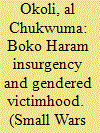

|
|
|
|
|
| Summary/Abstract |
Boko Haram insurgency in North East Nigeria has exposed women (girls, ladies, and mothers) to a complex jeopardy. While some women have suffered untimely widowhood or child-lack as a result of the Boko Haram onslaught, others have suffered death, forced abduction, and allied assaults on the main and side lines of the insurgency. Oftentimes, women have faced direct violence that essentially degrade their humanity. This is evident in the deployment of women as war-front sex slaves, human shields, and suicide bombers by the insurgents. The virtual expendability of women in the context of Boko Haram insurgency has been vividly demonstrated by the gale of female suicide bombings in Nigeria over the recent years. By means of a textual and contextual analysis of library sources and/or documentary data, as well as an adroit application of the theory of objectification, this study posits that, in addition to suffering collateral vulnerabilities, women have equally been instrumentalized as objects of terror in the context of Boko Haram insurgency. The paper further argues that the ‘weaponization’ of women’s bodies as bomb vessels and human shields by the insurgents highlights the height of women’s corporal victimization and objectification in contemporary asymmetric warfare.
|
|
|
|
|
|
|
|
|
|
|
|
|
|
|
|
| 15 |
ID:
122224
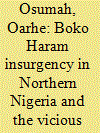

|
|
|
|
|
| Publication |
2013.
|
| Summary/Abstract |
The phenomenon of the Boko Haram insurgency in Northern Nigeria has generated many security concerns. This article explores the implications of the Boko Haram insurgency in Northern Nigeria for internal security. The article, which relies on a study of secondary sources of data, reveals that the insurgency has spawned varied implications such as an international image crisis, huge economic losses, a health and humanitarian crisis, a huge burden on the security apparatuses, arms proliferation, and endangered national unity. It holds that the insurgency is essentially interlinked with a breakdown of the social contract manifested in opportunistic behavior, economic stagnation, and lack of functioning institutional mechanisms for policy conduct and conflict resolution. Owing to the security menace posed by the insurgency, the article recommends that the root causes of the insurgency should be tackled rather than relying on reactive measures that cannot guarantee enduring peace and internal security.
|
|
|
|
|
|
|
|
|
|
|
|
|
|
|
|
| 16 |
ID:
151373
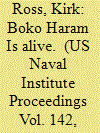

|
|
|
|
|
| Summary/Abstract |
he Terrorist group in Nigeria has been pronounced dead. It is far from it.
|
|
|
|
|
|
|
|
|
|
|
|
|
|
|
|
| 17 |
ID:
117645
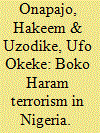

|
|
|
|
|
| Publication |
2012.
|
| Summary/Abstract |
Since the July 2009 Boko Haram terrorist outburst in Nigeria, there have been increasing questions on the phenomenon in the country. There has not been any substantial analysis on the emergence of the Boko Haram group and its terrorist activities in Nigeria as the out-rage continues. This study is advanced to explain the phenomenon of Boko Haram terrorism in Nigeria. It employs the levels of analysis framework popular in the field of international relations to explain the terrorism at three major levels: individual, state and international. The study relies on dependable news reports, which include interviews with key actors relevant to the subject matter, and finds that Boko Haram terrorism has its roots in the ideology and motivations of its founder and members, the failures and deficiencies of the Nigerian state, and the modern trend of religious terrorism in the international system.
|
|
|
|
|
|
|
|
|
|
|
|
|
|
|
|
| 18 |
ID:
113358
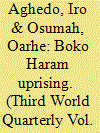

|
|
|
|
|
| Publication |
2012.
|
| Summary/Abstract |
Since the execution of Osama bin Laden and a few other al-Qaeda kingpins, the incidence of international terrorism seems to be on the decline and the 'war on terror' has been applauded as a huge success, with some even arguing that terrorism will fizzle out sooner rather than later. But recent experiences in Nigeria and some other African states reveal that, while global terrorism may be on the decline, the proliferation and radicalisation of local terrorist groups with possible links to al-Qaeda seem to be on the rise. The quest for effective counter-terrorism therefore continues. This article interrogates how Nigeria should respond to the Boko Haram terrorist uprising. Methodologically it relies on both primary and secondary sources of data. It provides an overview of the evolution and dynamics of the uprising in Nigeria, and explores the motivations, strategic operations and responses of Boko Haram. The article shows that the uprising, which engenders general insecurity, is a consequence of governance failure and institutional fragility. Thus, it concludes that, to effectively address the uprising, Nigeria should adopt a human security approach rather than the current emphasis on a repressive state security approach.
|
|
|
|
|
|
|
|
|
|
|
|
|
|
|
|
| 19 |
ID:
178936
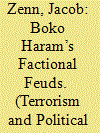

|
|
|
|
|
| Summary/Abstract |
This article examines the factions, leadership, and internal organization of Boko Haram, the terrorist group which has operated to devastating effect in parts of northern Nigeria, Niger, Chad, and Cameroon. It finds the group’s leadership has been significantly more centralized than previous literature has acknowledged. The leadership was also extremely ruthless but enforced group cohesion by killing anyone who sought to defect. Group members attempted to defect and depose the leadership in 2012 and 2016 by seeking external interventions from Al Qaeda in the Islamic Maghreb (AQIM) and the Islamic State of Iraq and the Levant (ISIL), respectively. In the first instance Boko Haram’s leadership demonstrated control and influence by forcing defectors back into submission, but in the second instance ISIL-backed militants deposed the leadership in a rebellion and coup. The loyalty to ISIL of jihadist commanders and foot soldiers in Nigeria explains why only the rebellion and coup succeeded in 2016 even though AQIM provided greater material support to the first set of defectors in 2012. This article contributes to research on internal dynamics of Boko Haram, the relationships between Al Qaeda and ISIL and their allied and affiliated organizations, and the costs and benefits of extreme leadership for terrorist groups.
|
|
|
|
|
|
|
|
|
|
|
|
|
|
|
|
| 20 |
ID:
164148
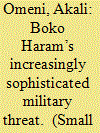

|
|
|
|
|
| Summary/Abstract |
This paper evaluates Boko Haram’s military capabilities and details the process of how its standing army, driven by these capabilities, came to pose a phased threat between 2013 and 2015 in particular. This was a period when military fighting dominated the insurgency in north-east Nigeria. Whereas there is an abundance of literature on Boko Haram’s histories and the impact of its insurgency on north-east Nigeria, analysis of Boko Haram’s military campaigning is still deficient. Attempting to fill this gap, this paper uses field findings and battlefield case studies from north-east Nigeria to highlight how Boko Haram’s overt front – its standing army – came to supplant its guerrilla operations as the main security threat to the frontier area.
|
|
|
|
|
|
|
|
|
|
|
|
|
|
|
|
|
|
|
|
|